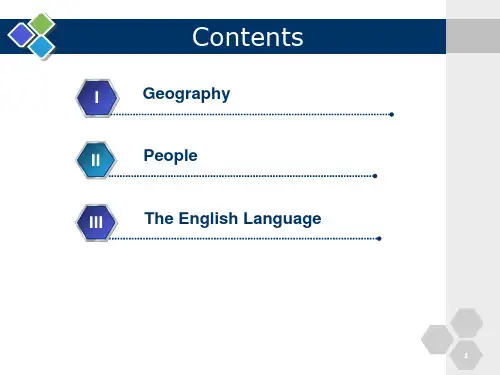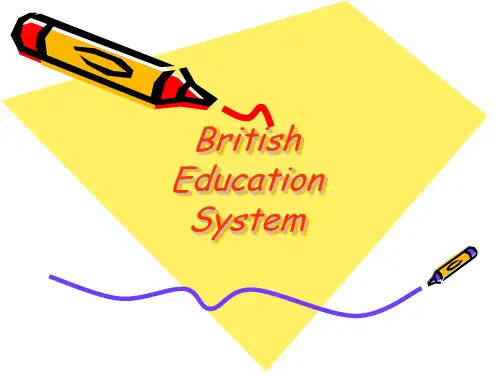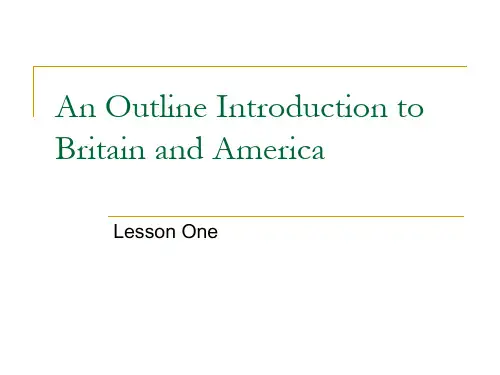英美概况课件Lecture1
- 格式:ppt
- 大小:2.30 MB
- 文档页数:46
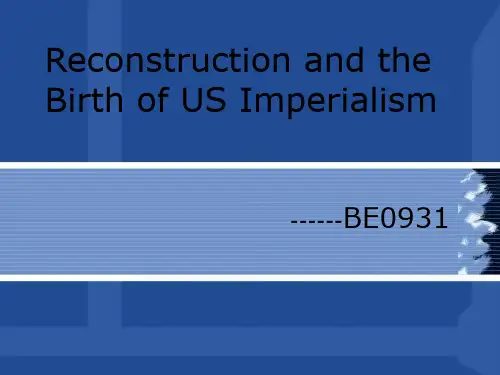

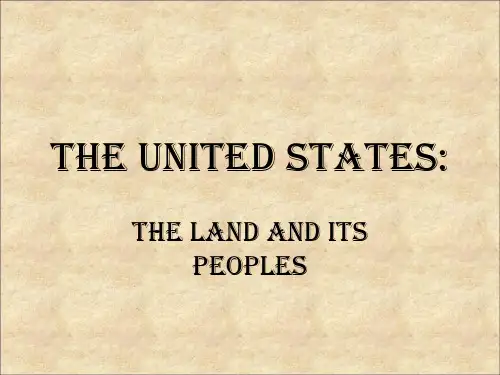
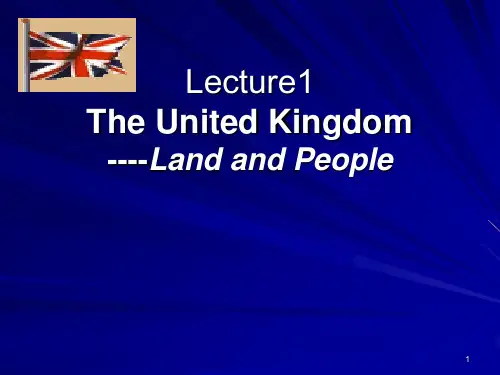
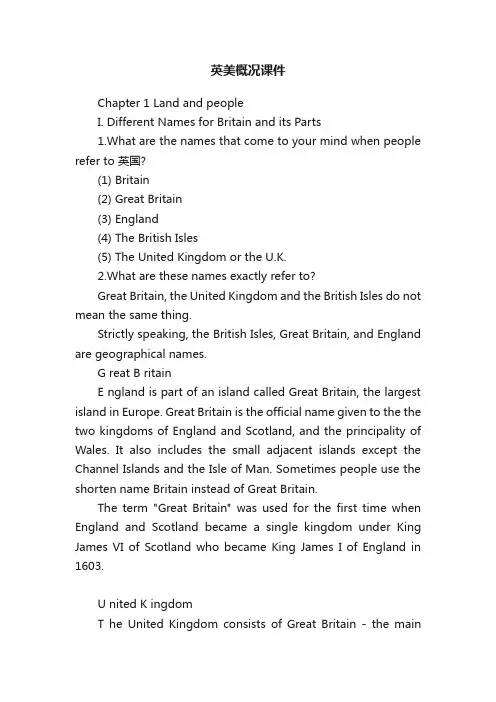
英美概况课件Chapter 1 Land and peopleI. Different Names for Britain and its Parts1.What are the names that come to your mind when people refer to 英国?(1) Britain(2) Great Britain(3) England(4) The British Isles(5) The United Kingdom or the U.K.2.What are these names exactly refer to?Great Britain, the United Kingdom and the British Isles do not mean the same thing.Strictly speaking, the British Isles, Great Britain, and England are geographical names.G reat B ritainE ngland is part of an island called Great Britain, the largest island in Europe. Great Britain is the official name given to the the two kingdoms of England and Scotland, and the principality of Wales. It also includes the small adjacent islands except the Channel Islands and the Isle of Man. Sometimes people use the shorten name Britain instead of Great Britain.The term "Great Britain" was used for the first time when England and Scotland became a single kingdom under King James VI of Scotland who became King James I of England in 1603.U nited K ingdomT he United Kingdom consists of Great Britain - the mainisland made up of England, Scotland and Wales - and Northern Ireland.The United Kingdom of Great Britain and Northern Ireland (UK) was formed in on January 1 1801 and constitutes the greater part of the British Isles. The largest of the islands is Great Britain, which comprises England, Scotland and Wales. The next largest is Ireland, comprising Northern Ireland, whichT he B ritish I slesThe British Isles include the UK, Great Britain, and other islands such as Ireland and the Channel Islands.The British Isles consists of:Great Britain (England, Scotland and Wales)The whole of IrelandThe Orkney and Shetland IslandsThe Isle of ManThe Inner and Outer HebridesThe Isle of WightScilly IslandsLundy IslandThe Channel IslandsPlus many other offshore islandsSummery:EnglandGreat Britain ScotlandWales U.K.2 large islandsNorthern IrelandBritish Isles IrelandRepublic of IrelandHundreds of (1949)small islands3.What is the official name of Britain?(1) The United Kingdom of Great Britain and Northern Island(2) For short: Britain, the United Kingdom or U.K.*The Union Jack--refers to the Union Flag or the National flag of the United Kingdom--It is called the Union Flag because it represents the emblems of the four countries united under one Sovereign - the kingdoms of England and Wales, of Scotland and of Ireland (although since 1921 only Northern Ireland has been part of the United Kingdom).--Although the name "Union Jack" is the popular name by which the flag is known to the world, it should strictly, perhaps, only be used for the flag when it is flown as a jack (a small flag flown at the bow of a ship); government documents generally prefer "union flag" as the more universally correct term4.Why do people often us e “England” and “English” to refer to “Britain” and“British”?England is the largest, post populous, and the richest.Largeness Size Pop.England biggest 60% 85%Britain Scotland 2nd largest 30% 1/10Wales smallest 9% 5%5.British imperial expansion“The sun never sets on the British Empire”(1) Ruled 1/4 of the world?s population and 1/4 of world?sland(2) Had colonies in North America, Asia, Africa, Austrialia6.British Commonwealth (Commonwealth of Nations)The term …Commonwealth? has been used to replace the word …Empire? to describe collectively the independent countries associated under the British crow(1) A free association of countries used to be English colonies(2) 53 member countries at present(3) Functions: active in a number of areas including development, democracy, debtmanagement and trade.II. Geographical features1.Geographical positionThe United Kingdom of Great Britain and Northern Ireland (UK) is situated north-west of the European continent between the Atlantic Ocean and the North Sea. It has a total land area of 244,100 square kilometres, of which nearly 99% is land and the remainder inland water. From north to south it is about 1,000 kilometres long.(1) Northwest of Europe(2) North Atlantic Ocean(3) Separated from the rest of Europe by the English Channel2.Geographical features(1) An island country, surrounded by sea(2) Highlands in the north and west(3) Lowlands in the east and southeastA. Part of the great European PlainB. Level land and fertile soilC. farming(4) 3 natural zones in ScotlandA. the highlands in the northB. the central lowlandsC. the southern uplandsIII. Rivers and LakesImportant role of rivers in the country?s economy1.Important Rivers(1)the Severn RiverA.the longest in the countryB.only 338 kilos long(2)the Thames RiverA.the 2nd longestB.the most important riverC.336 kilos longD.Oxford and London are on the river(3)River ClydeA.the most important in ScotlandB.important commercial waterway2.the Lake District(1)in northwest England and North Wales(2)popular tourist attractions(3)the home of the Lake PoetsA.William WordsworthB.Samuel Taylor ColeridgeC.Robert SoutheyIV. Climate1.Typical feature of Britain’s climate“Other countries have a climate; in England we have weather.”The statement is often made by Englishmen to describe the peculiar meteorological conditions of their country.A maritime type of climate(1)rainy---abundant rainfallThe uncertainty about the weather tends to make the Englishmen cautious.“A foreigner may laugh when he sees the Englishman setting forth on a brilliantlysunny morning wearing a raincoat and carrying an umbrella, but he may well regret hislaughter later in the day!”(2)changeable and unpredictable, no clear cut of 4 seasons“In no country other than England, it has been said, can one experience four seasons in the course of a single day! Day may break as a balmy spring morning; an hour or solater black clouds may have appeared from nowhere and the rain may be pouring down.At midday conditions may be really wintry with the temperature down by about eightdegrees or more centigrade. And then, in the late afternoon the sky will clear, the sunwill begin to shine, and for an hour or two before darkness falls, it will be summer.”(3)Mild: no extremesIn England one can experience almost every kind of weather except the most extreme.temperature: 4-6℃in winter, 12-17℃in summer2.Factors influencing the climate(1)the surrounding waters(2)the prevailing south-west winds(3)the North Atlantic Drift (warm current)3.Rainfall(1) a steady reliable rainfall throughout the year(2)uneven distribution of rainA. a water surplus in the north and westB. a water deficit in the south and eastV. The People1.Population of Britain: characteristics(1)Densely populatedVery large population for such a small country.(2)Highly urbanized90% of the population is urban and only 10% rural(3)Unevenly distributedThe population is made up mainly of (composition of British population)A.the English (81.5%)B.the Scottish (9.6%)C.the Welsh (1.9%)D.the Irish (2.4%)2.Different ancestors(1)the English----the Anglo-Saxons(2)the Scots, Welsh, and Irish----the Celts3.Differences in character and speech between southern and northern England(1)Southerners speak the type of English closer to BBC EnglishGenerally speaking, southerners speak the type of English closer to BBC English.They do not have a special accent except the Cockneys from the East End of London.(2)Northerners speak broader EnglishHowever, the northerners speak broader English than thesoutherners, and often leaveout the article “the” and the possessive adjectives “my”, “your”, “their”, etc.4.The way the Welsh keep their language and culture aliveThrough Eisteddfodau (Eisteddfod)(1)The Eisteddfod (literally 'sitting') is a Welsh festival of literature, music, and song. Thetradition of such a meeting of Welsh artists dates back to at least the 12th century.The most important eisteddfod is the National Eisteddfod, held annually and usuallyalternating between North and South Wales, and taking place entirely in the Welshlanguage.(2)The Welsh are music lovers and are proud of their past.(3)Throughout the year they have festivals of song, dance and poetry called Eisteddfod(au),hold competitions in Welsh poetry, music, singing and art to keep the Welsh languageand culture alive.Chapter 2The Origins of a Nation (5000BC-1066)I. Early Settlers (5000 BC—55BC)1. The Iberians伊比利亚人(1)Who were the first known settlers (inhabitants) of Britain?The Iberians(2)When did they come to Britain?At 3000 BC during the New Stone Age(3)How do you know that the Iberians were the firstknown settlers to Britain?A. The proof is the long barrows (古墓冢) found, which were their communal burialmounds (公墓)B. the Stonehenge (圆形巨石群、阵):a.It is a circular group of large standing stones constructed before 2000 BC.b.It is regarded as one of the most important monuments of its kind in Europe.c.Exactly why it was built is unknown but it must have had religious and politicalsignificance.(There are many different ideas about the purpose of Stonehenge: it may have beena center of sun worship, and was perhaps an observatory)d.Some think the Stonehenge is associated with the Celts.2. The Beaker Folk宽口陶器人(以其铃、钟形宽口陶器而闻名)(1) When and where were they from?At about 2000 BC (at the early Bronze Age) the Beaker Folk arrived from the areas now known as Holland and the Rhineland.(2)Why were they so called? (How did they take their name?)from their distinctive bell-shaped drinking vessels (or beakers)(3)How about their civilization? (What did they bring with them?)a)The art of pottery makingb)The ability to fashion (ornament with patterns) bronze toolsc)The custom of individual buriald)The hill forts (堡垒) and small fortified towns (筑堡城镇). TheMaiden Castle is oneof the finest examples.3. The Celts(1) Who were the ancestors of the Scots, Welsh and Irish?The Celts were the ancestors of the Scots, Welsh and Irish(2) When and where were they from?They began to arrive about 700 BC, and may have come from eastern and central Europe, now France, Belgium and Germany(3) What were these people?A.They were Practised farmers. They drained much of the marshlands and built houses ofwood and wickerwork with a weatherproof coating of mud.(带有抗风化的泥层)B.They were ironworkers.(4) What was their religion?Druidism(德鲁伊德教),the Druids—the wise men, astrologers, soothsayers(占卜者)II. Roman Britain (55BC—410AD)1. What do you know about the Roman invasion of Britain?(1)British recorded history begins with the Roman invasion.(2)In 55 BC, the great Roman general Julius Caesar invaded Britain for the first time(partly to gather information about the island and partly to punish the Belgae who helped in fighting against the conquering Roman)the invasion was unsuccessful because of resistance, the successful invasion did not take place until nearly a century(3)In AD 43, Emperor Claudius invaded successfully(4)For nearly 400 years Britain was under the Roman occupation, but it was never a totaloccupation.First, as a result of resistance; Secondly, Roman troops were often withdrawn fromBritain to fight in other parts of the Roman Empire.2. the Hadrian’s Wall哈德良长城(公元2世纪,罗马皇帝哈德良下令修建的城墙,用于防御英格兰北部边境,抵抗克尔特部落的进攻)It was one of the two great walls built by the Romans to keep the Picts out of the area they had occupied and conquered.(1)After the Roman occupation, the Romans met with fierce resistance and attacks from thetribes of Scotland. These people were called Picts(皮克特人)because of their “paintedfaces”. )(2)The Romans realized that they could not conquer them. So they withdrew from the north,and built two great walls, the Hadrian?s Wall and the Antonine Wall, to resist the attacks)3. the Roman contribution(1) they built a network of towns on their military camps with the capital of London(the suffix –caster or –chester in English place names—Lancaster, Winchester—derives from castra, the Latin word for camp.)(2) the Romans constructed a network of major and secondary roads. From London, roadsradiated all over the country.(3) The Romans made good use of Britain?s natural resources. They built baths, temples,amphitheatres and beautiful villas.(4)The Romans also brought the new religion, Christianity, to Britain.4. Why was the Roman influence on Britain so limited?Although Britain became part of the Roman Empire, the Roman impact upon the Britons was surprisingly limited as a result of(1)the Romans always treated the Britons as a subject people of slave class.(2)The Romans and the Britons never intermarried during the 4 centuries.(3)The Romans had no impact on the language or culture of ordinary Britons.III. The Anglo-Saxons (446-871) 盎格鲁-萨克逊人1. Who were the Anglo-Saxons?The Anglo-Saxons referred to the three Teutonic tribes(日而漫部落)who invaded Britain in the mid-5th century. They were Jutes, Saxons and Angles.--The Jutes 朱特人, from today?s Denmark, came to Britain first for assistance to drive outthe Picts and Scots.--Then the Saxons from northern German--The Angles who also came from northern German and were to give their name to the English people.2. How did the Heptarchy (七王国) come into being?During the Anglo-Saxon invasion, the three tribes named the Jutes, the Saxons and the Angles settled in different parts of Britain which was divided into many kingdoms. Among them, there were 7 principle kingdoms of Kent, Essex, Sussex, Wessex, East Anglia, Mercia and Northumbria. So they have been given the name of Heptarchy.3. Offa’s Dyke欧发大堤(古代英格兰的巨大土方工程。


